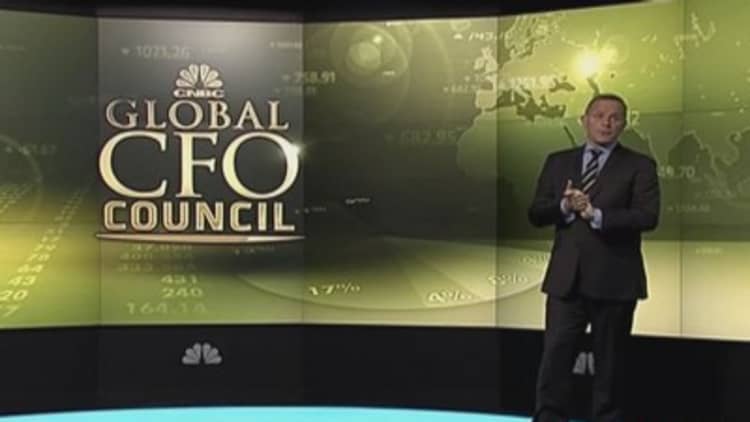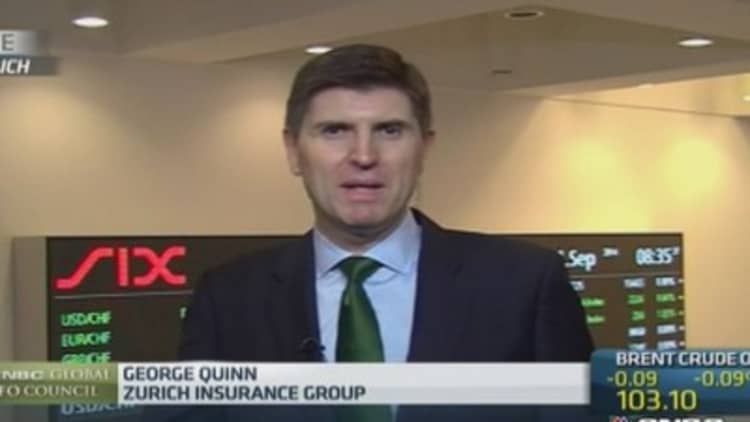
Lofty valuations in stocks and geopolitical tensions have left some chief financial officers (CFOs), from some of the biggest firms in the world, wary of a sharp fall in share prices, according to a new survey conducted by CNBC.
Fifty-one CFOs from Europe and Asia - who make up the CNBC CFO Global Council - were asked what they thought the likelihood would be of a "significant" stock market correction by the end of 2014. Thirty seven percent of respondents believed that it was deemed "somewhat unlikely", while the same amount also thought it was "somewhat likely". One respondent even suggested that a correction was "highly likely" before year-end.
Read MoreS&P 'running on fumes': SocGen's Albert Edwards
The results show that finance chiefs lack genuine confidence that share prices will continue to rise and the overall picture bolsters a general feeling of caution as the bull market ploughs into its sixth year.
Baris Oran, head of finance at Turkish conglomerate Sabanci, told CNBC Monday that his biggest concern was when the U.S. Federal Reserve might look to begin raising its main benchmark interest rate and how this could affect developed stock markets.
"The timing of the Federal Reserve moves is going to be critical here," he said, adding that developed market valuations were quite high, although some emerging markets still had more room to push higher.
George Quinn, CFO of Zurich Insurance Group, echoed the general view of the survey saying that it was very hard to reach a strong conclusion on which way markets would head.
"The geopolitical issues I think rob the market of some of the confidence that would otherwise drive economic growth," he told CNBC Monday. "(It's) really important to make sure we don't bet on one outcome or the other, so we try and take a balanced view."
60% drop for stocks?
Often used as a global benchmark for stocks, the managed to close above the 2,000 point level for the first time on record last week. This significant landmark also marked a 200 percent return for the S&P 500 since hitting a 2009 low of 666 points in March of that year.
Many economists believe that this run-up has been due to extra liquidity that central banks have pumped into the economy alongside record low interest rates in the hope that it would stimulate borrowing. But after more than five years of equity markets which have seemingly been on an unstoppable course, more and more analysts have predicted that valuations could have become stretched. Statistics from Google analytics even show that online searches for "stock market correction" are once again nearing a peak.
David Tice, president of Tice Capital and founder of the Prudent Bear Fund, told CNBC that markets could soon face a fall of up to 60 percent with the most likely cause being disillusionment with the Federal Reserve's policy guidance. Meanwhile, MacNeil Curry, head of global technical strategy at Bank of America Merrill Lynch, sees no signs of an imminent hit to equities and predicts further upside for the S&P 500 over the course of the next few weeks, reaching the 2,050 to 2,060 point level by late September.
A correction is usually classed as a drop of 10 percent within a two-month period. Some European markets have already witnessed this dip in the summer months with Germany, Spain and Italy seeing this drop and Greece and Portuguese bourses officially entering bear market territory. Earlier in the year, technology stocks in the U.S. also entered a technical correction on valuation fears.

Tax code change
Aside from concerns in the equity markets, the finance execs from the CNBC CFO Global Council also called on the U.S. government to reform the current tax code. The debate over so-called tax inversion rules came to a head this summer with President Barack Obama pressing for the closure of loopholes that allow U.S. companies to pen cross-border deals. These deals enable them to move headquarters abroad and gain access to a lower tax rate.
Read MoreHow Shiller is signaling 'significant upside' for S&P
Sixty-four percent of respondents said that they either "agree" or "strongly agree" that Congress should be reforming this corporate tax code. Just 5 percent of respondents told CNBC that they were against the idea of a change. Thirty six percent "disagreed" that U.S. companies are being fairly taxed by their government and 47 percent had a "neutral" perspective on the question. However, 42 percent of the chief financial officers "disagreed" or "strongly disagreed" that U.S. companies planning tax inversions were unpatriotic, with 52 percent having a "neutral" perspective.
Sabanci's Oran said that U.S. tax rates were quite high and complex and agreed that emerging markets - like Turkey - were benefiting from this, with U.S. companies deciding to base their operations in different jurisdictions.
The CNBC survey also showed that governments and regulators have been busy stepping up the monitoring of businesses. Sixteen percent of respondents noted that there had been a "significant increase" in governments or regulators taking a greater role in monitoring or regulation over the past 12 months. Forty seven percent of respondents have seen a "slight increase" in regulation.






